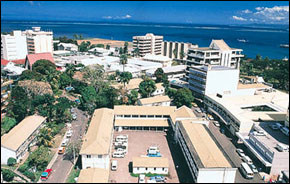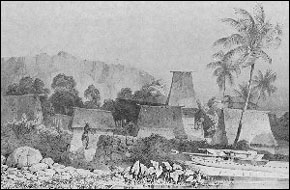 GOVERNMENT GOVERNMENT
|
On October 10,1970, after 96 years of British rule,
Fiji ceased to be a British Crown Colony. On that
day independence granted and Fiji became a self-governing
nation within the Commonwealth. Soon after the 1987
military coups, Fiji was declared a Republic. It
re-entered the commonwealth in 1997.
Under the current set up, the President is the Head
of State with the Prime Minister as the head of
Government. Fiji's constitution provides for a bicameral
parliament, comprising the President, an elected
House of Representatives with 1 members, and a nominated
Senate that has 32 members.
Under the current Government, the country is divided
into four districts for administration purposes,
Central, based in Nausori, Eastern, based in Levuka,
Northern based in Labasa and Western based in Lautoka.
Each of these administrative jurisdiction over the
various provinces that came within each district
division. There are 14 provinces in total, each
governed by a council which has an executive head
appointed by the Fijian Affairs Board (FAB). City
and town councils generally administer urban affairs.

The 20th century brought about important economic
changes in Fiji as well as the maturation of its
political system. Fiji developed a major sugar
industry and established productive copra milling,
tourism and secondary industries.
As the country now diversifies into small-scale
industries, the economy is strengthened and revenues
provide for expanded public works, infrastructure,
health, medical services and education.
The countries central position in the region has
been strengthened by recent developments in sea
and air communication and transport. Today, Fiji
plays a major role in regional affairs and is recognized
as the focus point of the South Pacific.

 BOSE LEVU
VAKATURAGA BOSE LEVU
VAKATURAGA |
The Bose Levu Vakaturaga (BLV) or Great Council
of Chiefs is the highest assembly of the traditional
chiefs of Fiji, with a small number of specially
qualified commoners, who meet at least once a year
to discuss matters of concern to the indigenous
Fijian people. In earlier days this Council had
the power to pass laws and regulations binding Fijians
but this was removed towards the end of the colonial
era when separate Fijian regulations were abolished.
Despite this, the council's advice is always sought
on matters affecting the Fijian people, and it continues
to be held in high esteem by all communities in
Fiji. The BLV appoints the President of the Republic
of the Fiji Islands. Chiefs make decisions at the
local level as well as being extremely influential
at a national level through the Bose Levu Vakaturaga
or the Great Council of Chiefs. The Former prime
minister and coup leader, Sitiveni Rabuka, is now
a chairman of the council. |

The basic unit of Fijian administration is the koro
(village) headed by the turaga-ni-koro(a heredity
chief), who is appointed by the village elders.
Several koro are linked as a tikina, and several
form a yasana or province. Fiji is divided into
14 provinces, and each has a high chief.
The Great Council of Chiefs includes members of
the lower house as well as nominated chiefs from
the provincial councils. The council was originally
created to strengthen the position of a ruling Fijian
elite, and gained great power after the military
coups and the introduction of the 1990 constitution.
The council appoints the judges, in consultation
with the Judicial & Legal Services Commission.
It also has authority over the legislation related
to land ownership and common rights.
 JUSTICE JUSTICE
|
A high court, a Fiji Court of Appeal, and a Supreme
Court administer Justice in Fiji. The Magistrates
Court deals with most criminal and civil cases.
A small Claims Tribunal has been up to the President
in consultation with the Prime Minister appoints
eight judges. The Supreme Court is the superior
court of record with unlimited criminal jurisdiction
to hear any criminal or civil cases involving those
interpretation of the constitution.
 LABOUR
REGULATION AND EMPLOYMENT STANDARDS LABOUR
REGULATION AND EMPLOYMENT STANDARDS |
Fiji has adaptable, disciplined, English speaking
and readily available labour. The total labour
force in 1996 was estimated at 301,500 of which
35% were in regular and paid employment. This
is indicative of labour availability.
The labour force is sufficiently educated as can
be noted by the fact that around 77% have had primary
and secondary education and with 4% having tertiary
education plus the fact that government is conscious
of the need to expand skills and develop aptitudes
to meet the demands of industrial development. The
main training institutes are:
Fiji Institute of Technology
University of the South Pacific
Fiji College of Agriculture
Fiji National Training School
Fiji Garment Training School
University of Central Queensland, Fiji Campus
In addition to the above, there are also private
educational and vocational schools that offer
various training programs that adequately cater
for Fiji's manpower needs, including computer
trainings facilities.
 TRADE UNIONS
& EMPLOYEE/EMPLOYER ASSOCIATIONS TRADE UNIONS
& EMPLOYEE/EMPLOYER ASSOCIATIONS |
The formation, registration and conduct of trade
unions and employee/employer associations is dealt
with by the Trade Unions is compulsory and organizations
registered under the ACT as the corporate bodies.
Most of the labour undertakings are covered by collective
bargaining agreements negotiated with the registered
trade unions concerned. The government has long
encouraged a free Forum consisting of a representative
from the employer association , a trade union congress
representative and a government representative.
This body has not only attempted to provide a forum
for an open and full exchange of views but also
suggested annual wage income guidelines. In addition,
the Trade Union (Recognition) Act, cap.96 A. Sets
out the requirements for the union to receive recognition
for the purpose of collective bargaining with the
employer/employers. |

